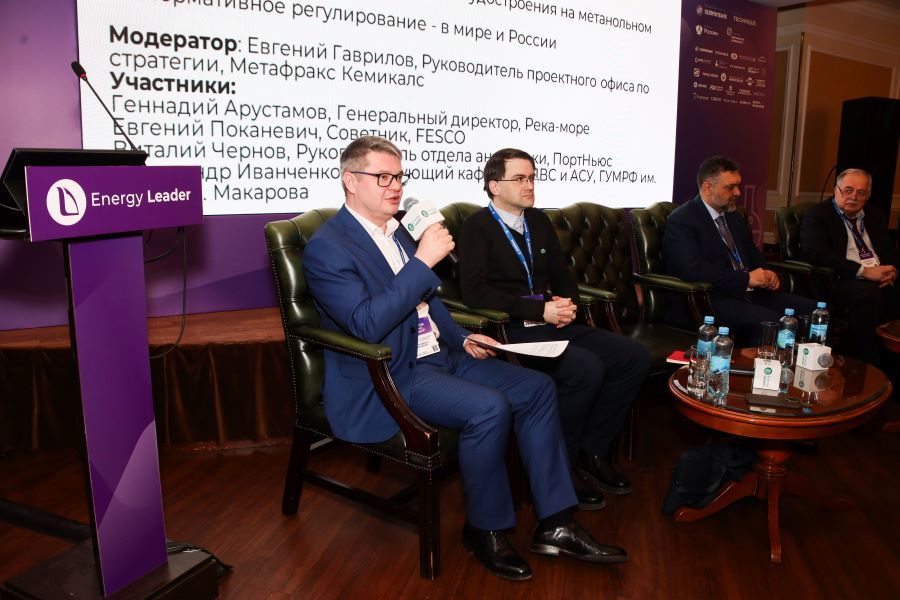Methanol as marine fuel – the prospect of the near future

The delegation of Metafrax Chemicals initiated a discussion on the prospects of using methanol as marine fuel at the "Gas and Chemistry 2025" conference.
The conference and exhibition titled "Gas and Chemistry 2025", which was held on 8-9th of April in St. Petersburg, brought together representatives of leading industrial companies, analysts, engineers, engineering and design specialists as well as experts from related fields. The business program covered key areas of industry development: from technological innovation and import substitution to the development of new markets, improvement of operational efficiency and compliance with environmental standards.
The partners of the event were Gazprombank (the general sponsor) as well as Ruschem, Metafrax Chemicals and Technique. The event was organized by Energy Leader.
The delegation of Metafrax Chemicals included Ivan Feoktistov, Strategy Director, Evgeny Gavrilov, Head of the Project Office for Strategy, Maria Konovalova, Director of Strategic Communications, and Karolina Leshchinskaya, Chief Analyst of the Project Office for Strategy.
One of the key events of the conference was the round table discussion titled "Methanol as marine fuel — market prospects in Russia". It was moderated by Evgeny Gavrilov.
The dialogue participants noted that they see the potential for significant consumption of methanol as a fuel in the shipping industry. This area has been developing for about 10 years - since the introduction of environmental control areas in international waters and the increasing attention to regulation of emissions. One of the ways to achieve de-carbonisation of shipping by 2050, as stated by the International Maritime Organization (IMO), may be the introduction of environmental charges for harmful emissions, which would stimulate fleet modernization and construction of ships operating on eco-friendly fuels.
During the discussion, opinions were expressed that despite the priority of "green" fuels, including methanol produced from biomass and renewable sources, their high cost does not yet allow for the expectation of mass introduction in the near future. At the same time, the participants of the round table discussion noted that methanol produced from natural gas is able to significantly reduce the level of emissions of pollutants such as sulphur and nitrogen oxides, carbon monoxide and particulates. Moreover, the use of traditional methanol is an intermediate step that will allow for creation of the infrastructure necessary for the large–scale introduction of "green" methanol in the future. According to expert estimates, this may happen closer to 2040.
Gennady Arustamov, General Director of "Reka-More", noted that each ship's entry into the port of a European country is already linked with environmental surcharges, which actually push for the renewal of the fleet in accordance with international requirements. Moreover, he added that the payback period for the methanol switch project is about 5-6 years. This calculation was made for the Azov basin, taking into account the use of Chinese equipment and the cost of methanol of about 20 thousand rubles per ton.
The discussion touched upon the technical features of using methanol, such as low flammability, insufficient lubricating properties, the need to adapt engine control systems as well as the advantages that make it one of the most promising marine fuels of the near future. That entails the absence of the need for liquefaction, reduced equipment wear and the relative availability of the technology. At the same time, all the problems listed above are being solved by current methanol engine manufacturers, including Chinese companies that demonstrate their willingness to cooperate with Russian shipowners. The experts also emphasized the need to launch research and development efforts to create domestic ship engines capable of efficient operation with methanol.
The "Gas and Chemistry 2025" conference demonstrated a high level of industry maturity and readiness for systemic transformation towards sustainable development, eco-friendliness and technological independence. The topics of discussion included technology, import substitution of equipment, development of project competencies, collaboration with Asian suppliers, optimization of logistics and elimination of personnel shortages. For the first time, water treatment and water purification issues were also included in the program.